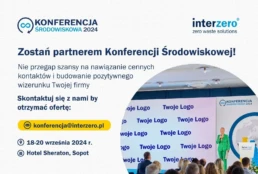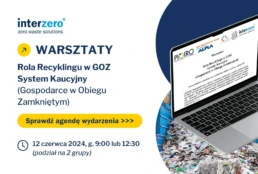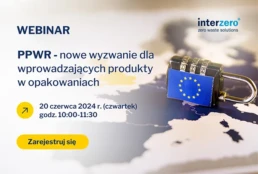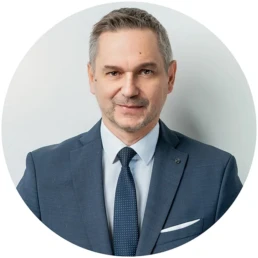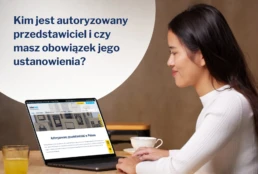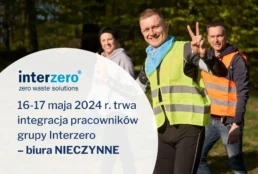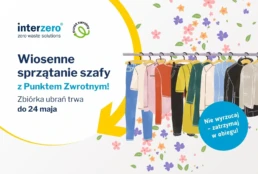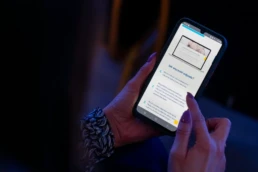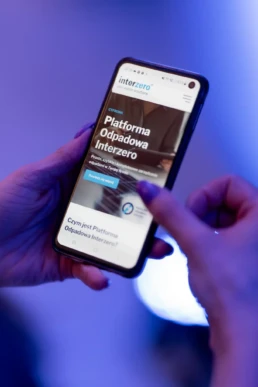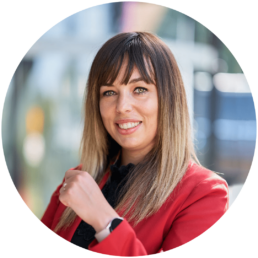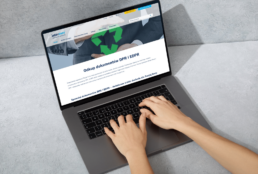Check out the agenda for the Environmental Conference 2024 event!
Check out the agenda for the Environmental Conference 2024 event!
Interzero's Environmental Conference will already take place in Sopot on 18-20 September, where we will address the most important and up-to-date topics related to legislation, environmental protection and ESG.
This year's event will focus particularly on issues related to the legal changes dictated by the transposition of the EU SUP and PPWR directives, the introduction of a nationwide bail-in system in Poland from 2025, as well as sustainability models for business. The agenda features no shortage of speakers from brands in the Polish market, business organisations and the environmental industry. Read on to find out what else you will find in the Interzero 2024 Environmental Conference programme - full agenda available on the event page.
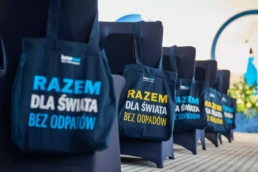
Bail system
As early as 2025, a deposit system will be in force in Poland, which will cover selected glass and plastic beverage packaging. This change poses quite a challenge for entrepreneurs, on whom obligations are imposed, including, among others, achieving a certain level of selective collection of packaging waste, keeping records or concluding an agreement with an entity representing in the deposit system. The Conference programme will include several lectures devoted strictly to the issue of the deposit system in Poland. Paweł Sosnowski, Plenipotentiary for Environmental Solutions at Interzero, will give a lecture entitled "Is a bail-in system without ROP a recipe for problems?", and Hanna Walczak, Implementation Manager at GS1 Poland, will talk about database standardisation in the lecture "Database for the bail-in system - what is worth knowing about it?". Also scheduled is a panel discussion "Deposit system - threat or opportunity for waste management?", which will include Interzero specialists, a representative of a trade network and an expert in the environmental industry with scientific and research achievements.
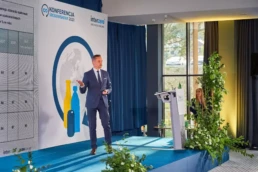
Interzero, together with the Polish Chamber of Packaging Recovery and Recycling, will set up an entity to represent entrepreneurs in the deposit system - learn more HERE.
Inextricably linked to this change is the EU PPWR (Packaging and Packaging Waste Regulation) directive, which sets top-down collection levels for packaging waste. The assumptions of this legislation will be outlined by Paweł Sosnowski in his lecture "PPWR, or new waste management solutions"; in the panel discussion "PPWR - how much will it cost us?" experts in the closed loop economy - including Piotr Mazurek from the Lewiatan Confederation and Robert Szyman, Director of the Polish Plastics Converters Association - will discuss the challenges of designing, producing and recycling packaging in the face of the new regulations.
Business sustainability
In addition to topics on the latest developments in national and European law, the Environmental Conference will discuss closed-loop economies, integrated environmental solutions, and sustainable business.
The circular flow of raw materials and products is an issue that will be of interest to all entrepreneurs who want to reduce their harmful impact on the environment and also reduce production costs. Speakers at this year's Environmental Conference will include experts from leading brands on the Polish market - including Wiktoria Płocha, Sustainability Business Partner at IKEA Retail with a talk on "Circularity - do we know where it starts?", Joanna Leoniewska-Gogola, Deputy Director Sustainability Consulting Central Europe at Deloitte Advisory, with a talk on "A company's circularity strategy in the context of the requirements of the CSRD non-financial report" or Jacek Płaza, Chief Sustainability Officer at Decathlon Poland with a talk on "How to reduce waste and develop new business models?".
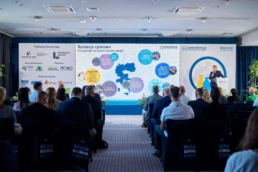
Mateusz Jemiol, producer and advertising director, as well as CEO of Mova Film, will talk about ESG from a marketing perspective in his lecture 'Can the subject of litter captivate the crowds? A recipe for an effective social campaign'.
Progressive technological development can go hand in hand with ecology - and this is thanks to digital tools to support waste management. In her talk, Aleksandra Mikiel, Operations Director at Interzero, will talk about Interzero Waste Platform - waste management tool.
Join the event today!
Would you like to become our partner?
Write to konferencja@interzero.pl
Summary of Open Day at Odra Cement Works
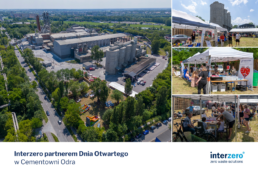
photo: Cementownia Odra
Summary of Open Day at Odra Cement Works
Cementownia Odra, the oldest operating facility of its kind in Poland, opens its gates to the general public once every two years. This year's event was unique, as it was organised for the first time since the pandemic. As in previous years, it attracted crowds of visitors, who had the opportunity to see the facility and explore the secrets of cement production, including technologies that minimise the plant's impact on the environment.
In his speech, Wojciech Putra, President of Cementownia Odra, emphasised that good neighbourliness requires trust, and the Open Day is an excellent opportunity to see for oneself what measures are being taken in the area of social and environmental responsibility.
Among other things, Opole residents learned that the cement production process is waste-free, while at the same time allowing the management of many difficult wastes such as:
- Fly ash (waste from power plant or thermal power station)
- Granulated blast furnace slag (waste from the steel industry)
- Reagips (waste from flue gas desulphurisation process)
- Copper slag (waste from copper smelters)
- Steel slags (by-product of the converter process)
- Alternative fuels (municipal and industrial waste)
Currently, 40% of the raw materials used in the production of Portland cements at the Oder Cement Works come from waste, and 60% of the energy is generated from alternative fuels.
In addition to the tour, the organisers provided a number of attractions, including performances by artists singing the greatest hits from the Opole Festival and a children's festival. In the children's zone, the Interzero stand was very popular, where visitors could playfully learn about the principles of correct waste segregation or prepare a small gift for their loved ones.
The Open Day at Cement Works Odra showed how this plant combines tradition with innovation and how it cares for the environment and the local community.
Interzero was one of the partners of the Open Day at the Oder Cement Works.
Workshop The Role of Recycling in the GOZ and the Operation of the Bail System
Workshop The Role of Recycling in the GOZ and the Operation of the Bail System
Join us for a unique workshop on the role of recycling in a Closed-loop Economy (SEE) and the operation of the deposit system. The meeting will be held 12 June 2024. at PRT Radomsko Sp. z o.o. (ul. Geodetów 8, 97-500 Radomsko).
The meeting is organised by Polish Chamber of Packaging Recovery and Recycling in cooperation with Interzero, the CPG Cluster, Ecokaucja S.A., the Foundation for Ecological and Educational Solutions "GREEN".
During the workshop, we will discuss key issues related to legislation, eco-design, recovery and recycling of packaging. We will then move from theory to the practical considerations of packaging waste management.
The workshop programme:
- Introductory presentation: "The impact of recycling on GOZ".
- Panel discussion: "Practical aspects of the Bail System".
- Visit to a PET bottle recycling plant: We learn about processing and the new life of plastic
Check out the full agenda for the event
The meeting is divided into two groups. The first group will meet at 9:00 a.m. and the second group will meet at 12:30 p.m. Each meeting will start with a discussion on legislation and practice in recycling in GOZ, followed by a tour of the PRT Radomsko plant and a live view of the PET bottle recycling facilities and process. Details of enrolment at the link.
You are welcome to attend free of charge! Places are limited, first come first served.
See you at the workshop!
Take part in the training course 'PPWR - a new challenge for packaging product introducers'.
Take part in the training course 'PPWR - a new challenge for packaging product introducers'.
There is growing environmental pressure on European Union countries to implement further measures to reduce the negative environmental impact of packaging. 24 April 2024 The European Parliament adopted the PPWR (Packaging and Packaging Waste Directive), which brings significant changes for entrepreneurs in the design, production and recycling of packaging.
The EU implements the rules not by way of a directive, but by way of a regulation. This means that the requirements will enter directly into the Polish legal order, without the need for time-consuming implementation as in the case of directives. It is time for a real packaging revolution and without unnecessary delays.
Who is affected by the changes?
Above all, producers of reusable and disposable packaging, recyclers and label manufacturers, as well as companies based in and importing into the EU.
It is worth finding out as soon as possible what changes await the Polish packaging market.
We would like to invite you to a webinar entitled "The world's most important events". "PPWR - a new challenge for packaging product introducers".which will already take place on 20 June 2024 (Thursday).
The online training will be led by: Pawel Sosnowski, Board representative for environmental regulation at Interzero
Scope of the webinar:
- Recyclability classes of packaging.
- Ecomodulation.
- Mandatory shares of recyclates in plastic packaging.
- Required proportion of reusable packaging.
- Adaptation of packaging volumes to the size of the products.
- Mandatory signage.
- Prohibition of certain packaging formats.
- Effective dates for the various obligations under the new legislation.
Registration for the webinar runs until: 20 June 2024 at 8:00 am.
You are welcome!
Become an official partner of the Interzero Environmental Conference!
Become an official partner of the Interzero Environmental Conference!
The 11th Edition of the Interzero Environmental Conference will be launched on 18 September at the Sheraton in Sopot! We warmly invite all those interested in promoting sustainable development to to cover the partnership our event.
Why become our partner?
- The Environmental Conference is an event that a wide range of pro-environmental topics (e.g. ESG, PPWR, GOZ, CSRD, CSR) attracts industry leaders, as well as expert companies and organisations related to the environment, recycling or sustainable development.
- By participating in the Conference you have the chance to make valuable business contactsas well as sharing experiences and gaining invaluable knowledge about the latest environmental trends, enabling you to build a more effective sustainable business strategy.
- As a partner an event focused on promoting sustainable development and integrated environmental solutions, build a green image for your company through real action to support the environment.
Would you like to find out more? Contact us at konferencja@interzero.plto receive an offer.
Details of the event available on the website of the Environmental Conference and on LinkedIn event.
Who is an authorised representative and who is required to appoint one?
Who is an authorised representative and who is required to appoint one?
Every entrepreneur placing electrical and electronic equipment on the market must comply with a number of obligations under the WEEE Act. Polish companies may do it themselves or through a recovery organisation. However, foreign companies may be obliged to establish in Poland authorised representativewho will perform the duties of introducer on their behalf.
Who appoints the authorised representative?
Manufacturers established in another EU Member State who:
- manufacture or market the equipment under their own name or trademark in the territory of the Member State concerned,
- resell under their own name or trademark equipment manufactured by others in the Member State,
- in the course of a commercial activity, equipment originating from a non-EU country or from another Member State is made available for distribution, consumption or use on the market of that Member State for the first time, whether in return for payment or free of charge
MAY appoint an authorised representative who will be responsible for carrying out, on the national territory, the obligations set out in the Act in relation to equipment placed on the market by that manufacturer.
In contrast, manufacturers established in another Member State or non-EU country and selling devices remotely in that country (e.g. via an online shop or sales platform) MUST establish an authorised representative.
As Interzero, we can take over your responsibilities under the Waste Electrical and Electronic Equipment Act. Our experts will get to know the specifics of your business and determine the type and status of your introductory duties, and then offer you the most favourable offer
For more information, please visit Authorised representative in Poland
Interzero Sustainability Magazine: shaping the circular economy
Interzero Sustainability Magazine: shaping the circular economy
As a leader in zero waste solutions, we are shaping the future of sustainability and the circular economy, as you will read in our latest Sustainability Magazine.
Guided by our vision of a 'world without waste', we are constantly working to turn this ambitious goal into reality. We continue to set new standards in the industry - from our innovative software Materialkontowhich provides full transparency and strategic access to processed raw materials, to the groundbreaking PET recycling plant in Liebenau. These successes are underlined by the prestigious German Sustainability Award 2024, which Interzero received in the category 'Waste Management and Recycling Industry', recognising our transformative work in waste management and resource conservation. We believe that our approach can be a source of inspiration - proving that environmental responsibility and economic prosperity can go hand in hand.
Our activities go beyond recycling; we actively collaborate with manufacturers (CLASSEN Group) or fashion brands (Marc Cain) to implement sustainable practices in various industries. Our initiatives, such as the 'We want Moor' campaign and our partnership with COREPLA for the RecoPet project in Italy, demonstrate our commitment to addressing environmental issues on many fronts. By investing in education through the International Zero Waste Academy and engaging in projects such as chemical recycling, we foster a culture of sustainability that encourages innovation and collaboration. As leaders in environmental stewardship, our holistic approach and tangible contributions are pushing the boundaries towards a more sustainable and cyclical future.
Read the whole HERE.
Interzero team integration trip on 16-17 May 2024.
Interzero team integration trip on 16-17 May 2024.
Dear Sirs,
We would like to inform you that in connection with the integration of the Interzero team, on 16-17 May this year. our branches in Warsaw, Krakow, Lodz and Katowice will be closedand contact with our staff will be difficult.
We will return to work on Monday 20 May. We apologise most sincerely for any inconvenience.
The Interzero team
Waste management - necessary but quick and easy with the right tools
Waste management - necessary but quick and easy with the right tools
Waste management is often a challenge that keeps entrepreneurs awake at night. It takes a lot of time and can be complicated. Nevertheless, it is a necessity, stemming from both legal requirements and the pursuit of sustainability. It turns out that there are tools that can make this task significantly easier. One of the most comprehensive solutions is Interzero Waste Platform.
Need or requirement?
Waste management is extremely important for companies generating significant amounts of waste. The legal precepts that are crucial in this case are the Waste Act of 14 XII 2012, the Act on Maintaining Cleanliness and Order in Municipalities of 13 IX 1996, the Act of 23 I 2020 amending the Waste Act and certain other acts, the Regulation on the Waste Catalogue, as well as the Regulation of the Minister of Climate of 23 December 2019 on the types and quantities of waste exempted from keeping waste records.
Violations of regulations on proper waste disposal can result in severe sanctions. These are envisaged for those who neglect their waste disposal obligations, including the accumulation of waste on illegal dumps or improper waste management, i.e. not in accordance with the permit obtained. The administrative penalty provided for ranges from PLN 1 000 to a maximum of PLN 1 000 000.
On the other hand, companies are increasingly feeling their own need to manage waste, due to the increasing public environmental awareness, including customers and business stakeholders. Companies are aware of the genuine need for change and are therefore taking measures to reduce their environmental impact. Efficient waste management is therefore becoming not only a legal obligation, but also a strategic choice to achieve sustainability and build a positive corporate image.
What is the problem?
It turns out that waste management poses many problems for Polish entrepreneurs. There are no universal solutions in this area, and after all, the capabilities and needs of each company are different and depend on a number of factors, including its size and industry. Nevertheless, waste management involves a number of common difficulties that affect many enterprises, regardless of their business profile.
One of the main problems is the time-consuming work involved in issuing waste transfer cards. This process requires a lot of details to be taken into account and is loaded with formalities, which usually proves to be very time-consuming. An additional burden is the need for regular and tedious record-keeping through the BDO system. This requires systematic updating of data and proper archiving of records, which can be a significant challenge for companies.
Monitoring the costs and revenues associated with waste management is another major issue. Keeping track of this data, especially for multi-site companies, often proves complicated and time-consuming. Managing different locations and maintaining contact with multiple waste recipients multiplies inconveniences, and this makes the search for effective solutions and efficient tools for waste management a priority.
Improvement hides on the internet
To solve these problems, companies use various treatments. They can hire a waste management specialist, set up an entire department dedicated to the issue or use modern online tools. Not only financial but also qualitative considerations speak in favour of choosing the latter. An example is Interzero Waste Platform. It is an innovative online tool that provides a one-stop solution that is used by both large corporations and small businesses, regardless of the industry in which they operate.
– Interzero's Waste Platform is an innovative online tool designed for efficient waste management and environmental record keeping in companies. Each system developed by Interzero is unique and tailored to the specific needs of each company. For large corporations and networked entities, using the Interzero Waste Platform means simplifying, accelerating and standardising waste management processes. For smaller companies, on the other hand, it represents an opportunity to reduce burdensome duties related to waste management, BDO reporting and handling of municipal declarations - explains Aleksandra Mikiel, Chief Operating Officer, Interzero.
It is a tool that allows you to act quickly and conveniently. There are a number of benefits to using it, including reducing waste management costs, increasing profits from raw material sales, automating waste collection and recovery logistics, streamlining and standardising waste management processes across the company, reducing the risk of errors when entering data into the BDO system, and the ability to store and manage all environmental documentation in one place.
Convenience of use and time saving
It is worth emphasising that The Interzero Waste Platform has been integrated with BDO, so that users benefit from a simple login function without the need for trusted profile authentication. When in use, the system remains stable and records data in real time and updates it in BDO. However, the convenience benefits do not end there, as the system guarantees the automatic creation and validation of KPOs at the time of waste export notification, the possibility to correct KPOs with 1 click, and the automation of waste record keeping (KEO).
Remote ordering of waste collection has been simplified to the extent that the collector receives a notification with complete information on the type of waste fraction, type of container and location. Additional telephone or e-mail contact is no longer necessary. Most importantly, however, the platform allows all environmental documentation to be stored and managed in one place.
Customers from more than 1,000 locations throughout Poland are already benefiting from the use of the Interzero Waste Platform. A total of almost 81,000 KPOs have been issued through it. Thanks to the platform, more than 2,300 KEOs have also been established, with more than 190,000 individual records. The platform can be tested for up to three months at no extra charge. This gives companies the opportunity to try out all its functionalities and see if it is the right tool for them.
Selling DPR and EDPR documents can be an additional source of income for your business
Selling DPR and EDPR documents can be an additional source of income for your business
In the changing landscape of environmental obligations and regulations, the issue of packaging waste remains a key issue. An essential element in managing this area is reliable documentation - including attestations such as DPR (document confirming the recycling of packaging waste) and EDPR (document confirming the export or intra-Community delivery of such waste for recycling).
Every entity that places packaged products on the market is obliged to recycle the resulting waste. This obligation can be fulfilled in three ways: independently, by Interzero Packaging Recovery Organisation (Producer Responsibility Organisation) or by paying a high product fee. In the first two cases, proof of recycling at the appropriate level is provided by the documents mentioned: DPR and/or EDPR.
Interzero not only relieves the formal, but also the financial burden on entrepreneurs in this regard. We are talking here about the sale of DPR and EDPR. Now, your company's waste management can generate not only costs, but also revenue. If you have already complied with the obligation to achieve the relevant recycling levels for the year, you do not need DPRs and EDPRs or have free documents, you can resell them to Interzero!
As a packaging recovery organisation we offer a comprehensive service in this area - On behalf of our clients, we request DPRs and EDPRs from recyclers or exporters and then, after verifying them for quality, buy back the excess documents from the companies. The profit from the sale can become a significant income for your company.
Statutory recovery and recycling levels are set separately for each type of packaging waste and are gradually increasing from year to year. It is therefore worth reducing your company's waste management costs by reselling unnecessary documentation. Write to recykling@interzero.pl and find out the best DPR and EDPR buyback offer for your company or check out the details: HERE
If you want to better understand the subject of the correct issuing and subsequent use of DPR and EDPR documents, attend the training available on the platform Interzero Academy: HERE
This is the ideal time to review your recycling strategy and make sure you are taking the best possible course - for the environment and for your business.
Need support? We are here for you. Write to us! We will prepare the most favourable offer for the repurchase of DPR and EDPR documents for your company
Email: recykling@interzero.pl
